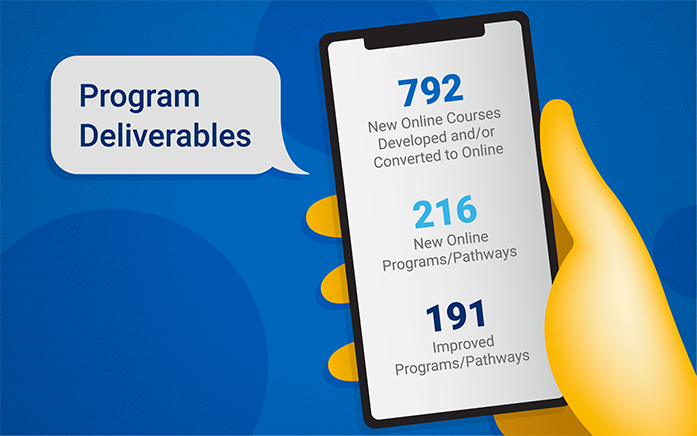Improving Online CTE Pathways Grant Program
Learn about the good work of our grantees.

For a full announcement, please read the complete award memo.
Background
With an open access mission, the California Community Colleges are positioned to support our diverse population to increase wages and improve social mobility in a rapidly changing economy. In addition to the formation of a new online community college, the California legislature and governor have provided funding to support existing California Community Colleges in accelerating innovative online learning opportunities leading to increased employ-ability and upward mobility for working Californians.
The Budget Act of 2018 (SB840) and trailer bill (SB843) appropriate one-time funds of $35 million to the Online Education Initiative (through Foothill – De Anza Community College District as grantee and fiscal agent) to develop online programs and courses that do either of the following:
(a) (1) Lead to short-term, industry-valued certificates or credentials, or programs.
(2) Enable a student in a pathway developed by the California Online Community College to continue his or her education in a career pathway offered by an existing community college.
(b) The Online Education Initiative shall develop application criteria and guidelines to administer the program. The criteria and guidelines shall not grant preference to either option specified in subdivision (a).

In California, 2.5 million adults in the prime working ages of 25 to 34 have only a high school diploma or some college but no degree. Demographic data shows an additional 6.2 million adults with the same level of educational attainment between the ages of 35 to 65 could also benefit from additional access to online education opportunities linked to increased employability and industry-valued credentials or programs (source: California Department of Finance; California Community Colleges Chancellor’s Office).
Online education in the California Community Colleges is demonstrating a strong trend of continued success over time. Data from the California Community Colleges Distance Education Report show a trend of continued improvement in online course completion rates from 2013-14 to 2016-17. One third of students in the California Community Colleges system now take at least one class online, and the statewide average rate of student success has closed to within four percent of the statewide average for traditional campus-based courses.
The Improving Online CTE Pathways grant program has been developed by the California Virtual Campus – Online Education Initiative (CVC-OEI) pursuant to the allocation of $35 million in one-time funding through the Budget Act of 2018 (SB840) and the trailer bill (SB843) and with direction from the Board of Governors and Chancellor’s Office of the California Community Colleges.
Grant Information
The California Virtual Campus-Online Education Initiative (CVC-OEI) Improving Online CTE Pathways grant program provides competitive grants to community college districts to develop online programs and courses that support either of the following:
- Lead to short-term, industry-valued certificates or credentials, or programs.
- Enable a student in a pathway developed by the California Online Community College to continue his or her education in a career pathway offered by an existing community college.
Grants may range in size from tens of thousands of dollars up to several hundred thousand dollars, however, they may not exceed $500,000 per college/district. Projects are to be implemented within the one year funding timeframe. Additionally, grants may be awarded to individual college or districts, or multiple colleges and/or districts working together as partners. Grants will be administered by the Foothill-De Anza Community College District, serving as the fiscal agent for the CVC-OEI.
Depending on total funds awarded, CVC-OEI may issue additional calls for participation.
Program Goal
The Improving Online CTE Pathways program was designed to leverage existing capabilities within the CCC system, while also integrating together with the CVC-OEI’s objectives.
Grant proposals must fall within one of the three approved tracks:
- TRACK 1: Improve access to and quality of existing online programs: Key themes emerged during discussions with stakeholders throughout the system. Maximum impact can be achieved not just by creating new online courses or programs, but more importantly by expanding access to existing but locally or regionally-siloed online CTE-oriented programs or certifications – e.g., increase capacity or frequency of sections not available anytime / anywhere; and support colleges to improve the quality, accessibility, and equity of existing offerings.
- Increase access to existing online certificates, credentials or programs.
- Increase visibility of existing online certificates, credentials or programs.
- Improve quality of existing online certificates, credentials or programs.
- Expand availability of C-ID designators for CTE courses.
- TRACK 2: Increase the number of online programs that meet workforce needs by filling in gaps within programs – missing content, missing courses; leveraging industry partnerships to create or expand access to online programs; and encourage collaboration between colleges to offer joint programs.
- Fill gaps in existing on-ground certificates, credentials or programs.
- Build an online certificate, credential or program that addresses regional workforce needs.
- Develop a replicable model for advancing credit for prior learning pathways and solutions.
- Create online programs using industry content, Zero Textbook Cost Materials, and/or Open Educational Resources.
- Review industry-approved curriculum
- TRACK 3: Support students, faculty, staff and campus leaders by supporting the student groups that could most benefit from expansion of online, by offering targeted support structures.
- Create a jointly offered program with another college or district in the CCC system.
- Pilot tools for students to chart and track progress on academic pathways.
- Support students staying on their existing academic pathways.
As this augmentation initiative, Improving Online CTE Pathways, involves one-time funding over a brief period, these college- and district-level grants are intended to help a CCC campus, district, or partnership to complete short-term projects that:
- can be implemented within one year (July 2019 through June 2020), and
- lead to lasting institutional innovation beyond the one year grant timeframe.
Process Summary
The Improving Online CTE Pathways program is structured into two phases:
- Phase One: Grant Planning & Preparation - February 2019 to June 2019
- During this time, colleges/districts will convene local teams and develop a plan, resulting in a grant application. Following awarding in May 2019, colleges will commence preparation for grant implementation, effective July 01, 2019.
- Phase Two: Grant Implementation - July 2019 to June 2020
- Official authorization period for the grant is July 01, 2019 to June 30, 2020. For more information on reporting requirements and other milestones, please refer to the RFA.
For more information on deadlines and grant milestones, please refer to the RFA.
